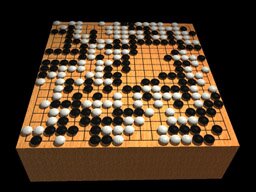Go Artificial Intelligence
By ai-depot | June 30, 2002
![]() Looking beyond the rules of Go, this article explains why Chinese Weiqi is such a fascinating game for AI researchers. Analysis of human approaches to the game prompts the description of multiple algorithms and techniques that may ’solve’ Go in the future.
Looking beyond the rules of Go, this article explains why Chinese Weiqi is such a fascinating game for AI researchers. Analysis of human approaches to the game prompts the description of multiple algorithms and techniques that may ’solve’ Go in the future.
Written by Andy Coates.
Introduction
The game of Chess was for a long time known as the ‘fruit fly’ of Artificial Intelligence due to the fact that it was believed that if a system could be designed capable of beating the world master at chess, it would be because an intelligent machine had been built.
Image 1: A finished game of Go ending in a win for black.

However, this milestone was passed in 1997 and unsuprisingly, since the common conception is still that truly intelligent computers don’t exist :), the goalposts have been moved. Alex’s article describes how Deep Blue should not really be considered an intelligent machine.
Some people argue that since the game of Go, like Chess, is also essentially a ‘rule based’ problem that there is therefore no compelling reason to attempt the problem of Computer Go, and that new and different types of challenges should be found to tackle.
In this article i’m going to try and convince you that getting computers to play Go is such a challenge, that although it is still a ‘rule based’ game, it has required new approaches in order for computers to play Go to a level of even a novice human, and that further advances in AI are needed before a computer will even be able to challenge a world master (unless it wants to get it’s butt whipped!).
Tags: none
Category: essay |


March 2nd, 2008 at 9:22 pm
Very interesting, thanks.